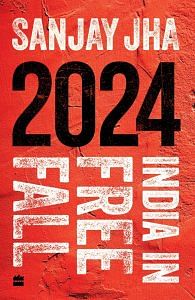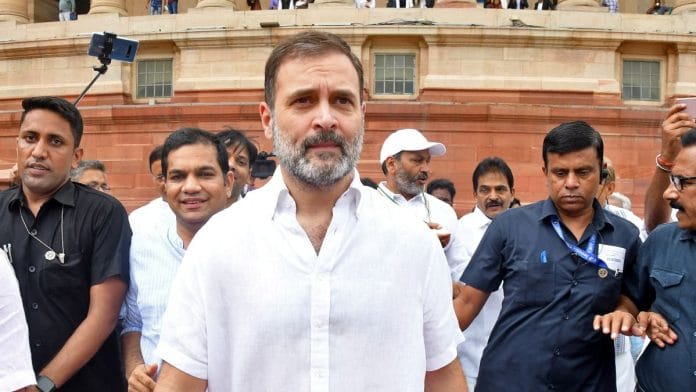BBM was the first messaging service; it appeared like a private bubble, offering both confidentiality and unlimited texting for free. So prized was the BlackBerry that former US President Barack Obama in his autobiography, A Promised Land, talks about a heart-breaking separation from his favourite device for security reasons. The Indian National Congress, the party which inspired the great Indian freedom struggle against the British Raj, was for long, like BlackBerry, India’s preferred operating system.
Of course, that was eons ago. BlackBerry does not exist anymore (it has an enterprise software model now). Like BlackBerry in the smartphone industry, Congress once overwhelmingly dominated the political narrative in India. If BlackBerry in 2009 had 50 per cent of the US smartphone market, Congress regularly won absolute majorities on its own in the Lok Sabha; its peak was 404 seats in 1984.
By 2014, BlackBerry’s market share had nose-dived to less than 1 per cent (with losses at USD 1 billion). In the same year, Congress was reduced to 44 Lok Sabha seats, and WhatsApp, which initially appeared to be a poor third cousin of BBM, got a whopping valuation of USD 19 billion from Facebook. BBM had sunk into a rabbit hole. Do you see the similarities here? Both Congress and BlackBerry remained adamant that all was well in the hope that the slipping customer/voter mindshare, at worse, was a transient aberration. It would naturally fix itself. It did not.
The Congress, plagued by internal hubris, underestimated the regional satrap from Gujarat who was revolutionizing the BJP. It seemed content with delusions of grandeur, of being ‘India’s natural party of governance’. Once again in 2019, the Congress was vanquished, getting 52 seats, while the BJP won a massive 303. It was time to get seriously concerned. One of managements’ most over-used clichés is ‘reinvention’. Periodically, every CEO pays homage to this homily, though few really walk the talk.
Politicians more so; in fact, the Congress chose to be fossilized, becoming a reluctant reformist at best. But as the Congress trouble-shooters attempted to put an end to months of infighting between a confident but smug Captain Amarinder Singh and a recalcitrant and trigger-happy Navjot Singh Sidhu, many political pundits applauded the magic formula of brokering peace by the Congress in Punjab as a ‘pragmatic bold risk’. It was 2021. Elections were due in the February of 2022.
Was the Congress belatedly waking up to the reality that the good old days of incremental fiddling were over? That perhaps the time had come to take some imaginative strides which might even boomerang in the short term? Or was this just a desperate reaction to being pushed to a corner, an unsustainable frail détente at best?
In his seminal work Think Again, Adam Grant, an organizational psychologist at Wharton, talks of the ‘overconfidence cycle’ trap that BlackBerry had fallen into. The Congress had been afflicted by the same bugbear, and many of my former colleagues were convinced in early 2014 that at most the BJP would be a seasonal flavour. They have been proven wrong. Repeatedly.
The Congress must aspire to be an Apple, pushing boundaries, forcing inventions, periodically rejigging its mammoth organization and recalibrating its storytelling. It has limited options, because political depreciation can become a death wish. Unlike BlackBerry that had to contend with several competitors, Congress is the only pan-India alternative to the BJP. The latter’s subpar performance (including its pandemic mishandling, Pegasus snooping, ravaged economy, high fuel prices, sectarian tensions, undermined institutions, record unemployment, etc.) could affect its political fortunes in 2024. But the Congress was being unusually magnanimous towards it.
To effectively challenge the BJP, the Congress must avoid falling into the trap of self-sabotage, as highlighted in discussions about its recent strategies. The party’s ability to innovate and present a compelling narrative is crucial, especially when considering the revolutionary ideas that have often backfired in the past.
There were five things the Congress could do to seize the governance debate: elect a Congress president (it did finally), bring the Congress under RTI and disclose source of funds (a game-changing move to checkmate BJP’s electoral bonds chicanery), decentralize administration and election management by appointing vice presidents for different regions, revitalize grassroots by having transparent elections from block levels to the CWC, and instead of focusing on personality politics like the BJP, bring back the original ‘Congress collective’, a culture of dynamic teams (Gandhi, Nehru, Patel, Bose, Maulana Azad, etc.) who challenged each other, prioritizing nation-building over petty politics. Inner democracy could galvanize the Congress.
The Congress must create an alternative national blueprint and knock on every door to inspire a shared vision. The BJP for all its current hegemony must know that BlackBerry’s cataclysmic fall was also because it had just one product category: mobile phones. You have to break eggs to make an omelette; the ball was in the Congress’s court, to seize the initiative, create a positive narrative and build a coalition, but that could only happen if it revitalized itself.
In politics, breaking bread with people is a significant milestone. Food, incidentally, can be quite an ice-breaker and a good way to kickstart a change. It was good to see Congress leaders doing dinner diplomacy with friendly foes. One of the most underrated perquisites of being in Indian politics is the big chunks of chicken tikka masala floating gingerly in a placid ocean of high cholesterol, which is served on the luxuriant lawns of what is nowadays perceived to be a notorious elite neighbourhood, Lutyens Delhi.
At the home of former Congress MP Kapil Sibal’s home there was both gastronomic temptations as well as political confabulation in abundant supply. Exhibit A of Opposition leaders attended the dinner, each of them a formidable regional satrap. There was Sharad Pawar, Lalu Prasad Yadav, Omar Abdullah, Akhilesh Yadav, Pinaki Mishra, Sanjay Singh and Sanjay Raut, among others. In politics, atmospherics frequently overwhelm the message itself. At 8, Teen Murti Lane however they played as a doubles team. If I were to choose an alliteration to describe the evening’s summary, it would be anxiety, anger and apprehension at the state of the nation. There was unanimous agreement that Opposition unity was imperative to dethrone a belligerent BJP.
While most chose sombre if not altogether vapid utterances, so as to not upset Congressmen who were for a change in absolute majority there, there were others who preferred to address the elephant in the room: Was the grand old party geared up for the big fight ahead? Omar, most unlikely to eschew home truths, was forthright: If the Congress continued its southward slide, it was game, set and match for the BJP in the 2024 general elections, a consequence of an uneven playing field. Everyone applauded that, clearly relishing the political reality check as much as the papdi chaat with dollops of yoghurt topping which was being served, resembling Alaska facing the brunt of climate change.
For all the Congressmen present (which included P. Chidambaram, Manish Tewari, Prithviraj Chavan, Shashi Tharoor, Mukul Wasnik, etc.) they were reminded of that constant bogeyman, ‘time for introspection’. After suffering innumerable knockout blows, Congressmen conceal their sorrow effortlessly by being poker-faced. ‘Why is Congress blowing up an excellent opportunity to checkmate the BJP?’ was the usual refrain.
In a way, the answer to that would define the future of India. It was a conundrum that the G-23, who had their skin in the game and were present in full force, tried hard to crack. Without success. I skipped the dessert section because the focus of the evening shifted to healthier ‘low-hanging fruits’. The Congress actually had no pretext for underperformance, because the electoral calculus gives it a lower bar for government formation.
 This excerpt from Sanjay Jha’s ‘2024: India in Free Fall’ has been published with permission from HarperCollins India.
This excerpt from Sanjay Jha’s ‘2024: India in Free Fall’ has been published with permission from HarperCollins India.






